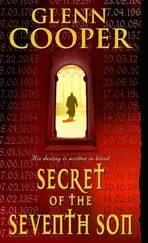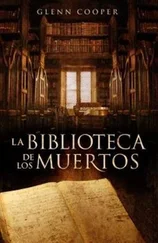Glenn Cooper - Library of the Dead
Здесь есть возможность читать онлайн «Glenn Cooper - Library of the Dead» весь текст электронной книги совершенно бесплатно (целиком полную версию без сокращений). В некоторых случаях можно слушать аудио, скачать через торрент в формате fb2 и присутствует краткое содержание. Жанр: Триллер, на английском языке. Описание произведения, (предисловие) а так же отзывы посетителей доступны на портале библиотеки ЛибКат.
- Название:Library of the Dead
- Автор:
- Жанр:
- Год:неизвестен
- ISBN:нет данных
- Рейтинг книги:3 / 5. Голосов: 1
-
Избранное:Добавить в избранное
- Отзывы:
-
Ваша оценка:
- 60
- 1
- 2
- 3
- 4
- 5
Library of the Dead: краткое содержание, описание и аннотация
Предлагаем к чтению аннотацию, описание, краткое содержание или предисловие (зависит от того, что написал сам автор книги «Library of the Dead»). Если вы не нашли необходимую информацию о книге — напишите в комментариях, мы постараемся отыскать её.
Library of the Dead — читать онлайн бесплатно полную книгу (весь текст) целиком
Ниже представлен текст книги, разбитый по страницам. Система сохранения места последней прочитанной страницы, позволяет с удобством читать онлайн бесплатно книгу «Library of the Dead», без необходимости каждый раз заново искать на чём Вы остановились. Поставьте закладку, и сможете в любой момент перейти на страницу, на которой закончили чтение.
Интервал:
Закладка:
The midwife turned to acknowledge the presence of the minister and simply said, "It is breeched."
Josephus edged up behind her, and the midwife suddenly lifted the shift to let him see a tiny purple foot dangling from Santesa's body.
"Is it a boy or a girl?"
The woman lowered the shift. "A boy."
Josephus gulped, made the sign of the cross and fell to his knees.
"In nomine patre, et filii, et spiritus sancti…"
But as he prayed, he wished with all his might for a stillbirth.
On a raw November night, nine months earlier, a gale blew outside the stonecutter's cottage. Ubertus stoked the fire for the last time and went from cot to cot checking on his offspring, two or three to a mattress except for Julianus, who was old enough for his own pallet of straw. Then he crawled into the master's bed beside his wife. She was on the verge of sleep, drained after another long day of heavy toils.
Ubertus tugged the heavy woolen coverlet to his chin. He had carried the cloth with him from Umbria in a chest of cedarwood, and it served him well in these harsh climes. He felt Santesa's warm body beside him and laid a hand on her softly heaving chest. The urge was there and his hardness would have to be satisfied. By God, he deserved some pleasure in this difficult, earthly world. He slid his hand down and pulled her legs apart.
Santesa was no longer beautiful. Thirty-four years and nine children had taken their toll. She was puffy and haggard and she chronically scowled from the pain of rotting molars. But she was nothing if not dutiful, so when she became aware of her husband's intentions, she sighed and whispered only, "It is the time of the month to take note of the consequences."
He knew precisely what she meant.
Ubertus's mother had borne thirteen children; eight boys and five girls. Only nine of them had survived to adulthood. Ubertus was the seventh son, and as he grew he carried this mantle. If ever he had a seventh son, that boy, by legend, would be a sorcerer, a conjurer of dark forces: a warlock, some said. Everyone in their hillside village knew about the lore of a seventh son of a seventh son, but no one, truth be told, had ever met one.
In his youth, Ubertus had been a lady's man and exploited the dangerous image of the potential locked within his loins. Perhaps he had used his status to bait Santesa, the prettiest girl in the village. Indeed, he and Santesa had teased each other over the years, but after the birth of their sixth son, Lucius, the teasing stopped and their sexual unions took on an air of gravity. Each of the next three births was the source of considerable trepidation. Santesa sought to foretell the sex of the babies by pricking her finger with a thorn and letting a drop of her blood fall into a bowl of spring-water. A sinking drop indicated a boy, but sometimes the drop sank and sometimes it floated. Blessedly, each child had been a girl.
Ubertus rammed himself in. She caught her breath and whispered, "I pray it will be another girl."
At her bedside, deep into the night, the situation was becoming more grave despite Josephus's urgent prayers. Santesa was too weak to scream and her breathing was shallow. The tiny protruding foot was getting darker, the color of the deep blue clay the abbey potters favored.
Finally, the midwife declared that something must be done or all would be lost. There was heated debate, then a consensus: the baby must be forcibly extracted. The midwife would reach in with both hands, grab each leg and pull as hard as was necessary. This maneuver would in all likelihood destroy the baby, but the mother might be spared. To do nothing would condemn both to certain death.
The midwife turned to Josephus for his blessing.
He nodded. It must be done.
Ubertus stood beside the bed, looking down on this catastrophe. His hugely muscled arms hung weakly at his side. "I beseech you, Lord!" he cried out, but no one was sure whether he was praying for his wife or his son.
The midwife began her traction. It was apparent by the strain on her face that she was exerting great effort. Santesa muttered something unintelligible but she was beyond pain.
The midwife loosened her grip and withdrew her hands to wipe them dry on her smock and catch her breath. She regripped the legs and began again.
This time there was movement. It emerged slowly. Knees, thighs, a penis, buttocks. Then suddenly it was free. The birth canal yielded to the large head, and the boy was wholly in the hands of the midwife.
It was a large baby, well-proportioned, but clay-blue and lifeless. As every man, woman, and child in the room watched in awe, the placenta squirted out and thudded onto the ground. With that, the baby's chest spasmed and it inhaled. Then another breath. And within moments the blue boy was pink and squealing like a piglet.
At the moment life came to the boy, death came to his mother. She took her last breath and her body went still.
Ubertus roared in grief and grabbed the infant from the midwife.
"This is not my son!" he screamed. "It is the Devil's!"
He moved fast, dragging the placenta along the dirt floor, using his shoulders to force his way through the crowd and out the door. Josephus was too stunned to react. He sputtered but no words came out of his mouth.
Ubertus stood in the road holding his son in his stonehard hands and he wailed like an animal. Then, as torch-bearing villagers looked on, he grabbed the umbilical cord and swung the baby high over his head as if he were wielding a sling.
He brought the small body crashing down hard onto the earth.
"One!" he shouted.
He swung it over his head and smashed it down again.
"Two!"
And over and over: "Three! Four! Five! Six! Seven!"
Then he dropped the bloody broken carcass onto the lane and numbly shuffled back into the cottage.
"It is done. I have killed it."
He couldn't fathom why no one was paying him any mind.
Instead, all eyes were on the midwife, who was hunched over the lifeless Santesa, frantically groping between her legs.
There was a shock of ginger hair showing.
Then a forehead.
And a nose.
Josephus watched in amazement, scarcely believing his eyes. Another child was springing from a lifeless womb.
"Mirabile dictu!" he muttered.
The midwife grimaced and pulled the chin free, then a shoulder and a long thin body. It was another boy, and without any prodding it instantly began breathing, strong, clear breaths.
"A miracle!" a man said, and this was repeated by everyone.
Ubertus stumbled forward and glassily took in the spectacle.
"This is my eighth son!" he cried. "Oh, Santesa, you made twins!" He warily touched its cheek as one might touch a boiling pot.
The infant squirmed in the hands of the midwife but did not cry.
Nine months earlier, when Ubertus had finished planting his seed, his spray had shot through Santesa's womb. That month, she had produced not one but two eggs.
The second egg fertilized became the baby who now lay shattered on a cart path.
The first egg fertilized, the seventh son, became the ginger-haired boy who now held every soul in the room spellbound.
MARCH 19, 2009
A s an only child growing up in Lexington, Massachusetts, Mark Shackleton was rarely frustrated. His doting middle-class parents satisfied every whim and he grew up with only a passing relationship with the word no. Nor was his inner life disturbed by feelings of frustration, since his quick, analytical mind sliced through problems with an efficiency that made learning nearly effortless.
Dennis Shackleton, an aerospace engineer at Raytheon, was proud that he'd passed on math genes to his son. At Mark's fifth birthday party, a family affair in their tidy split-level, Dennis produced a clean sheet of tracing paper and announced, "Pythagorean Theorem!" The skinny boy grabbed a fat crayon and felt the eyes of his grandparents, aunts, and uncles follow him as he approached the dining room table, drew a big triangle and underneath it wrote: a ^ 2 + b ^ 2 = c ^ 2. "Good!" his father exclaimed, pushing his heavy black glasses up the bridge of his nose. "Now what's this?" he asked, jabbing a finger at the long leg of the triangle. The grandfathers chuckled as the boy screwed up his face for a moment then exploded with: "The hippopotamus!"
Читать дальшеИнтервал:
Закладка:
Похожие книги на «Library of the Dead»
Представляем Вашему вниманию похожие книги на «Library of the Dead» списком для выбора. Мы отобрали схожую по названию и смыслу литературу в надежде предоставить читателям больше вариантов отыскать новые, интересные, ещё непрочитанные произведения.
Обсуждение, отзывы о книге «Library of the Dead» и просто собственные мнения читателей. Оставьте ваши комментарии, напишите, что Вы думаете о произведении, его смысле или главных героях. Укажите что конкретно понравилось, а что нет, и почему Вы так считаете.












